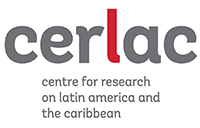
York’s Centre for Research on Latin America and the Caribbean (CERLAC) will celebrate its early years as a foundational institution in establishing Latin American and Caribbean studies in Canada at an upcoming symposium. It will also announce the winner of the annual TLN Telelatino Award.
Building the Foundations: A Symposium on CERLAC’s Early Years and the History of Canadian LAC Studies will take place Oct. 21, from 2 to 5:30pm, at 519 Kaneff Tower, Keele campus. The welcome reception will be at 2pm and the TLN Telelatino Award presentation will be at 2:45pm, followed by the symposium at 3pm. Everyone is welcome to attend. Refreshments will be served.
The speakers will be York economics Professor Louis Lefeber, CERLAC’s founding director; political science Professor Liisa North, a founding member of CERLAC; sociology Professor Peter Landstreet; humanities Professor Patrick Taylor; history and humanities Professor David Trotman; and Sally Humphries of sociology and anthropology at the University of Guelph.
The Director of CERLAC, Carlota McAllister, will chair the event, while former director Eduardo Canel, graduate program director of development studies, will be the panel discussant.

CERLAC has had a long and successful history, beginning with its inception in 1978. Not only was it the first research centre formally established at York University, it was also the first centre of research on Latin America and the Caribbean established in Canada, says North. “Its Fellows can take pride in a remarkable record of accomplishment, inspired and rooted in collaboration with Latin American and Caribbean colleagues in times of profound political and institutional transformation in the two regions.” Former students have gone on to work as teachers and researchers, and have been active in leading public policy formulation and civic activism.
A group of Brazilian and Chilean graduate students living in exile after having escaped military repression in their home countries were instrumental in shaping the early days of CERLAC, which was first called the Latin American Research Unit (LARU). These grad students came from economics, political science, and social and political thought, and helped form links with Latin American scholars who were “working under repressive military rule in their home countries or had been forced into exile when the universities where they taught were ‘intervened’ by the military,” wrote North in a brief history of CERLAC.
These links with leading Latin American intellectuals allowed CERLAC to be viewed as a trusted and legitimate association, which helped it to establish formal links with independent research and teaching institutions in various Latin American countries.
TLN Telelatino, which is celebrating its 30th anniversary, will film the event, including the honouring of the TLN Telelatino Award winner Yonita Parkes. Parkes graduated from York in June 2013 with a BA double major in law and society, and Latin American and Caribbean studies. She is currently completing a certificate in refugee and migration studies at York and plans to pursue a master’s degree in peace and conflict management studies. Parkes is a child and youth trauma counsellor at the Canadian Centre for Victims of Torture. The TLN Telelatino Award is presented annually to a York undergraduate student to recognize exceptional work in any area of study on the experiences of Hispanic people in Canada.
CERLAC is currently receiving donations for its Endowment for Research. To donate, visit the CERLAC giving page.
For more information, visit the CERLAC website.


